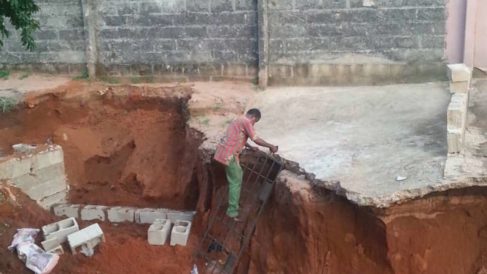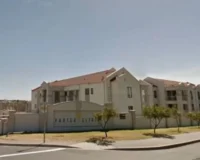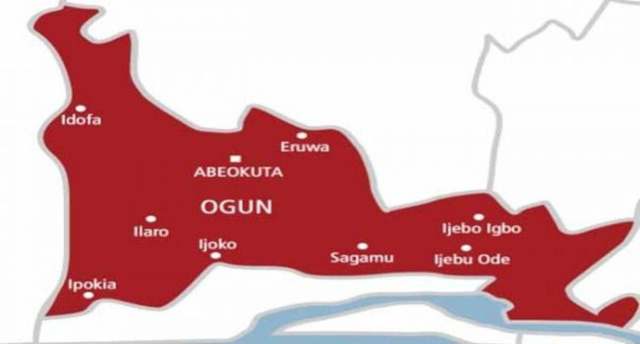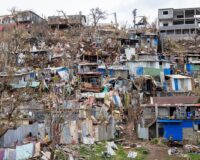Residents of Trinity Road Layout and its environs in Owerri North Council of Imo State, under the aegis, Trinity Neighbourhood Association, are living in palpable fear of erosion in the area.
Some have been forced to relocate, abandoning their edifices and other structures, while two major churches: St. Philip’s Anglican Church and Trinity Pentecostal Church, are hoping on God’s intervention.
Initially, some unaffected residents, a little far from the gully area, were unperturbed, but they became worried and are having sleepless nights as the devastation approaches their buildings.
The erosion, which started about 2015 at negligible scale, gradually began to impact on the residents in 2017 and has today culminated in a menace to the point that whenever it rains, the situation worsens, expanding in radius and keeping residents at alert.
When The Guardian visited the area, some families had vacated their homes. Occupants of a particular three-bedroom bungalow even left in 2018 when the gully became very deep and the foundation of the edifice in the middle of the gully.
Last week, some residents woke up to discover that the only narrow “entry and exit” into their compound had been washed away by the rain the previous night. They were trapped for days and it took the assistance of friends and relations to construct a very long ladder with which one of them, Mr. Emma Ogu, a lecturer at the Federal Polytechnic, Nekede, near Owerri, to take the risk, descending and ascending to buy foodstuffs for his family.
At a point, it became dangerous that they had to break the fence to enable them to relocate temporarily.
According to sources, the disaster was initially caused by uncontrolled floodwater coming from other places in the wake of the Urban Renewal Programme of the then governor of the state, Senator Rochas Okorocha. This is in addition to poorly constructed drainage in the market area at Akwakuma Junction, also in Owerri North Council.
Other residents, including occupants of two-storey buildings, no longer park their vehicles in their premises. In fact, they pay for spaces outside their homes and park their vehicles at the close of every work day.
Ogu, a former State Senior Correspondent of Champion newspapers, had moved into his bungalow in 2014 before he saw the problem approaching. His car was trapped a few months ago as a result rain in just one day.
A few months ago, the erosion began to approach his building, washing away land surface few steps to his home, degenerating to the extent that there was no space to drive in and out. But his wife was lucky, as she probably had a premonition of sort, and decided to park her car outside their home on that dangerous rainy day that devastated them.
Other residents close to the Ogu learnt from his experience and decided to park their vehicles at other premises where they pay for parking space on daily or monthly basis.
“A little drop from the sky, the entire area, with pressure, will be flooded. It started during the commencement of the Urban Renewal Programme of the then administration of Rochas Okorocha.
“Another suspicion is the activities of the sand miners around here, because any time it rains, some portions will cave in.
“Unless urgent intervention, the entire neighbourhood will be submerged. The gully will escalate and claim more structures. The major access road has been affected. All the residents now park their vehicles outside their homes, because there is no access road,” Ogu, whose car was trapped, lamented.
The residents are not just folding their arms; they have actually raised funds and commenced the erection of remedial stoppers to avoid further encroachment. But on each occasion, rain falls and washes away these remedial structures.
Chairman of the Trinity Neighbourhood Association, Chuks Michael Okafor, explained that they had been suffering from the disaster since 2015, pointing at Ogu, who he said had spent over N700, 000 in constructing palliative structures, which also caved in and were washed away by the flood.
He said they had written letters to Okorocha administration, the senator representing Imo East, Samuel Anyanwu, and his successor, Ezenwa Onyewuchi, the administration of Emeka Ihedioha and even the current administration of Senator Hope Uzodimma, all to no avail.
The Guardian Nigeria
Metro
Erosion: Fear grips trinity layout residents in Owerri
By Charles Ogugbuaja, Owerri
19 September 2020 | 4:06 am
The erosion site
Residents of Trinity Road Layout and its environs in Owerri North Council of Imo State, under the aegis, Trinity Neighbourhood Association, are living in palpable fear of erosion in the area.
Some have been forced to relocate, abandoning their edifices and other structures, while two major churches: St. Philip’s Anglican Church and Trinity Pentecostal Church, are hoping on God’s intervention.
Initially, some unaffected residents, a little far from the gully area, were unperturbed, but they became worried and are having sleepless nights as the devastation approaches their buildings.
The erosion, which started about 2015 at negligible scale, gradually began to impact on the residents in 2017 and has today culminated in a menace to the point that whenever it rains, the situation worsens, expanding in radius and keeping residents at alert.
When The Guardian visited the area, some families had vacated their homes. Occupants of a particular three-bedroom bungalow even left in 2018 when the gully became very deep and the foundation of the edifice in the middle of the gully.
Last week, some residents woke up to discover that the only narrow “entry and exit” into their compound had been washed away by the rain the previous night. They were trapped for days and it took the assistance of friends and relations to construct a very long ladder with which one of them, Mr. Emma Ogu, a lecturer at the Federal Polytechnic, Nekede, near Owerri, to take the risk, descending and ascending to buy foodstuffs for his family.
At a point, it became dangerous that they had to break the fence to enable them to relocate temporarily.
According to sources, the disaster was initially caused by uncontrolled floodwater coming from other places in the wake of the Urban Renewal Programme of the then governor of the state, Senator Rochas Okorocha. This is in addition to poorly constructed drainage in the market area at Akwakuma Junction, also in Owerri North Council.
Other residents, including occupants of two-storey buildings, no longer park their vehicles in their premises. In fact, they pay for spaces outside their homes and park their vehicles at the close of every work day.
Ogu, a former State Senior Correspondent of Champion newspapers, had moved into his bungalow in 2014 before he saw the problem approaching. His car was trapped a few months ago as a result rain in just one day.
A few months ago, the erosion began to approach his building, washing away land surface few steps to his home, degenerating to the extent that there was no space to drive in and out. But his wife was lucky, as she probably had a premonition of sort, and decided to park her car outside their home on that dangerous rainy day that devastated them.
Other residents close to the Ogu learnt from his experience and decided to park their vehicles at other premises where they pay for parking space on daily or monthly basis.
“A little drop from the sky, the entire area, with pressure, will be flooded. It started during the commencement of the Urban Renewal Programme of the then administration of Rochas Okorocha.
“Another suspicion is the activities of the sand miners around here, because any time it rains, some portions will cave in.
“Unless urgent intervention, the entire neighbourhood will be submerged. The gully will escalate and claim more structures. The major access road has been affected. All the residents now park their vehicles outside their homes, because there is no access road,” Ogu, whose car was trapped, lamented.
The residents are not just folding their arms; they have actually raised funds and commenced the erection of remedial stoppers to avoid further encroachment. But on each occasion, rain falls and washes away these remedial structures.
Chairman of the Trinity Neighbourhood Association, Chuks Michael Okafor, explained that they had been suffering from the disaster since 2015, pointing at Ogu, who he said had spent over N700, 000 in constructing palliative structures, which also caved in and were washed away by the flood.
He said they had written letters to Okorocha administration, the senator representing Imo East, Samuel Anyanwu, and his successor, Ezenwa Onyewuchi, the administration of Emeka Ihedioha and even the current administration of Senator Hope Uzodimma, all to no avail.
He revealed that the Commissioner for Environment, Iyk Njoku, visited the erosion site on July 2, this year, with the promise of reporting the extent of damage to the state government for attention, regretting that after the visit, nothing has happened, adding: “We are begging the government to come and help us, as this is beyond us or any individual. If that road from Egbema is tarred, it will help.
The latest letter addressed to Njoku and dated August 3, this year, read in part: “The devastation deepened on May 24, this year, with collapse of drainage and huge structures we erected to control the menace.
“As at the time of writing, the gully has expanded on the major access road in the neighbourhood.”
The residents said some compounds along the road have been totally cut off by the deep and wide gully, while tenants in some buildings could no longer easily access their compounds, even after the neighbourhood had spent millions of naira to control the erosion without respite until it became beyond individual or communal effort.
In response, the state government directed the Interim Management Committee chairmen in the 27 councils to work with the councilors in their areas to identify and compile all the erosion sites in their localities.
Njoku also said Uzodimma was deeply concerned about their experiences, regretting that due to the effects of the Coronavirus disease (COVID-19) pandemic, government was having financial difficulties to handle the sites.







